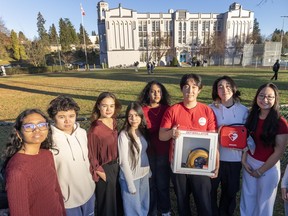New Education Minister Lisa Beare wants AEDs in schools, despite the Vancouver board’s hesitation to adopt the cardiac-arrest-reversing tools.

When she became B.C.’s new education minister a month ago, near the top of Lisa Beare’s to-do list was investigating how to get devices to reverse cardiac arrests into schools and to follow through with the premier’s promise for secondary students to learn first aid.
Recommended Videos
Beare’s support for having automated external defibrillators, or AEDs, in schools is in contrast to the Vancouver school board, which has hesitated to embrace the tools despite the impassioned pleas of a group of high school students who witnessed their friend die of a cardiac arrest.
“I’m fully committed to delivering our commitment of CPR in schools in September (2025), and I’m looking at how I can add AEDs into that conversation,” said Beare, who was sworn in as minister of education and child care on Nov. 18.
“I absolutely see the value of seeing these (AEDs) being in schools, and I fully support it.”
He and other students have since undertaken fundraising to buy several devices. And they made an emotional presentation to the Vancouver school board in November about why they should be allowed in local schools — just as they are in many other school districts in Metro Vancouver.

While Beare investigates a providewide AED policy, the Point Grey students will make a second attempt to convince Vancouver school trustees during the board’s budget negotiations, which start in January.
“This is something that I’m going to keep fighting for,” Zhang, 16, said.
In a recent email, the Vancouver school district maintained its position that staff are “actively working” on an AED plan, which includes maintenance, inspections, accessibility and training.
In the meantime, the board said it adheres to health board and WorkSafeBC guidance by having personal AEDs for a handful of children with known heart conditions.
Many other school districts, including Surrey, Delta, North Vancouver and West Vancouver, have for years had AEDs in every secondary school, and some are in elementary schools, too.
Community members have long asked Vancouver schools to follow suit, including teacher Wendy Swain after she saved her 12-year-old student in 2017 by frantically performing CPR because her Vancouver school didn’t have an AED.
Swain said the incident was “the most horrifying time in my life,” and is frustrated the board still hasn’t acted more than seven years later.
Beare said her ministry is investigating how many districts have AEDs, and the possibility of a provincial “directive” that they be adopted everywhere. She said it was too soon to say whether the money for the devices could be included in February’s provincial budget.
“Student safety is my top priority,” she added.
It’s possible the training will be done through high school gym classes. The training must also be compatible for online learners and students with disabilities, she said.

Echoing other physicians who publicly support the Point Grey students, McIntyre said it was “unconscionable” the Vancouver trustees sent them away in November instead of collaborating to get the AEDs they raised money for into their Vancouver school.
Beare was unable to commit to when those hires will happen, saying her ministry is working on how to recruit and train so many new staff.
The premier also promised during the election to spend $500 million over two years to expand child care spaces. Beare said conservations have started on how to achieve that, along with expanded before- and after-school care, but couldn’t say if the funding would be in February’s budget.

Zhang, on behalf of the group he formed, Students for AEDs, wrote to Beare and Eby earlier this month to request a meeting. He told the politicians that the sounds of his friend’s final gasping breaths and “the cries of his parents still haunt me to this day.”
Zhang insisted the provincial guidelines followed by the Vancouver district, to provide a personal AED to some students but not an entire school, does nothing to help people like his friend who had not been screened for a heart condition.
“The Vancouver school board’s decision to reject an AED for our school despite our fundraising efforts is both illogical and lacking in compassion for everyone on school grounds who may face a cardiac emergency,” Zhang’s Dec. 19 letter says.
Beare said that she and Eby are both willing to meet with Zhang’s group, and that the students are “top of mind” for her government.
By November, the students had already raised several thousand dollars to buy AEDs for Point Grey.
Since then, Vancouver-based Iridia Medical, which created the first workplace AED program in B.C. and sells the devices to the public, has told the students it is willing to donate five AEDs to the school board, Zhang said.
A letter that Iridia provided to the students says it would cost less than $400,000 over 10 years, or $38,000 a year, for the VSB to purchase, implement, and maintain 115 AEDs, noting an earlier estimate by the board was four times higher than the actual price.
“The importance of AEDs in schools cannot be overstated. Sudden cardiac arrest can strike anyone, at any time, and without warning. It does not discriminate — even young healthy individuals are at risk,” says the letter from Iridia, which was founded by a group of physicians.
For more health news and content around diseases, conditions, wellness, healthy living, drugs, treatments and more, head to Healthing.ca – a member of the Postmedia Network.